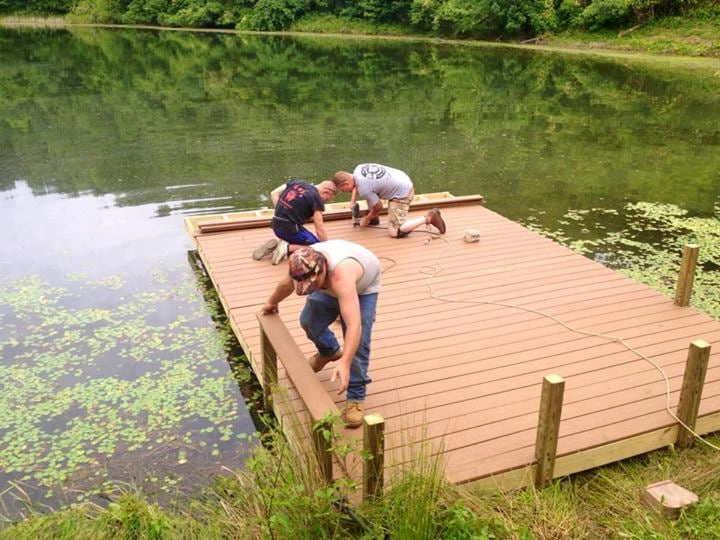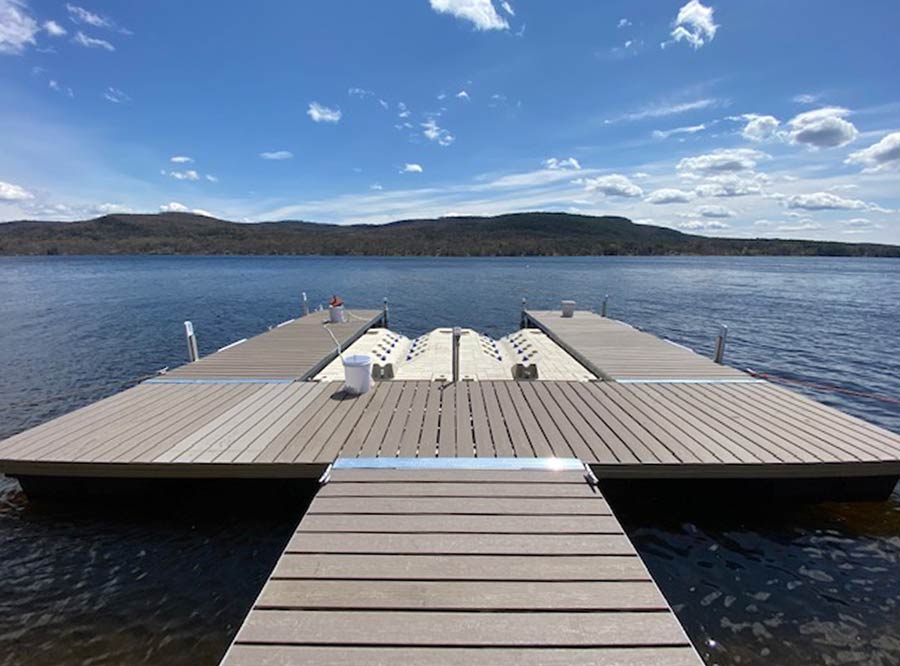Browsing the Options: Picking the Right Dock Company for Your Floating Dock Job
Browsing the Options: Picking the Right Dock Company for Your Floating Dock Job
Blog Article
Floating Docks: The Suitable Option for Versatile Water Accessibility
Floating docks present an engaging remedy for a variety of water access needs, offering adaptability that transcends typical mooring options. The modular nature of floating docks promotes personalization, providing to specific demands.
Benefits of Floating Docks
Floating docks offer various advantages that enhance water access for various applications. Their capacity to fall and climb with altering water levels makes them specifically useful in atmospheres with varying trends or seasonal variations. This adaptability makes certain that vessels can quickly moor without problem for the water's deepness, supplying a reliable platform for leisure, commercial, and industrial uses.
In addition, floating docks are usually constructed from resilient materials that resist deterioration, making them suitable for long-term usage in marine atmospheres. Their installation is generally less intrusive than conventional set docks, reducing the environmental impact and helping with quicker release (dock company). This adaptability permits easier moving or reconfiguration according to individual needs or ecological modifications
Safety is another vital advantage; floating docks can supply secure gain access to for people getting off or boarding from boats and minimize the danger of accidents related to unstable surface areas. They can be developed to fit a variety of devices, such as fenders and cleats, enhancing capability. Overall, floating docks represent a reliable service for enhancing water gain access to across diverse sectors while promoting safety and security and environmental sustainability.

Sorts Of Floating Docks
Various kinds of floating docks deal with various needs and atmospheres, each designed with particular attributes to maximize functionality. One of the most common kinds consist of modular docks, which contain interlacing sections that permit for simple customization and growth. These docks are excellent for leisure usage, as they can be tailored to fit numerous watercraft dimensions and water conditions.
An additional prominent choice is the fixed floating dock, which remains secured in location however floats with altering water levels. dock company. This kind is particularly matched for areas with minimal tidal changes, supplying stable accessibility for fishing or swimming. Furthermore, there are drive-on docks, which feature a sloped style that permits boats to conveniently drive on and off, making them ideal for personal watercraft and smaller sized vessels
For commercial applications, heavy-duty floating docks are available, created from strengthened materials to endure substantial lots and severe aquatic environments. Lastly, environment-friendly floating docks use sustainable materials and styles to lessen environmental effect, typically integrating features like plant life to support neighborhood wild animals. Understanding the numerous kinds of floating docks guarantees that individuals can choose the most appropriate solution for their particular requirements.
Setup Process Summary
An effective installation of floating docks requires careful preparation and focus to information to make certain ideal efficiency and safety. The initial action involves assessing the website conditions, consisting of water deepness, present, and potential challenges. This evaluation notifies the option of the appropriate dock materials and layout tailored to the particular environment.
Next, acquiring necessary authorizations is vital, as several territories have regulations regarding construction on water bodies. As soon as approvals are safeguarded, the installation here are the findings can proceed. Begin by preparing the foundation, which may include anchoring systems or pilings tailored to the dock type and neighborhood problems.
Adhering to the structure arrangement, put together the dock areas according to supplier specs. Ensure that all elements are safely secured and aligned to withstand ecological stress and anxieties. Placement the dock in the marked location, ensuring it is level and stable.

Upkeep Tips and Best Practices
After the installation procedure is total, ongoing upkeep plays a vital duty in ensuring the long life and capability of floating docks. Routine examinations ought to be carried out to identify any indicators of wear, wear and tear, or damage - floating docks. Look for any loosened installations, fractures, or splitting up in the dock areas, as these can compromise architectural honesty
Cleaning up the dock is vital to eliminate debris, algae, and various other accumulation that can impact its look and safety and security. Use a mild stress wash periodically to keep sanitation without causing damage to the surface area. Furthermore, using a safety sealer every couple of years can aid boost durability and resist ecological wear.
Take see post note of the mooring lines and anchors, guaranteeing they are free and safe and secure from corrosion. Replace any abject components without delay to prevent risks. Seasonal modifications might also be necessary; during extreme climate condition, repositioning or reinforcing the dock can prevent damages.
Applications for Floating Docks
Floating docks offer a multitude of applications, accommodating both business and leisure needs. In recreational setups, they give seamless access to rivers for activities such as boating, fishing, and swimming. Their flexible nature allows for installment in varying water levels, ensuring secure and risk-free access despite tidal fluctuations.
Readily, floating docks are crucial for marinas and beachfront organizations. They help with the docking of vessels, enabling efficient filling and discharging of products. Their modular design enables easy development or reconfiguration to fit transforming service needs, making them ideal for boat rentals, excursion operations, or fishing charters.
Additionally, floating docks are made use of in environmental applications such as marine research and environment restoration. They can act as systems for scientific researches, keeping an eye on water quality, or carrying out wild animals surveys without troubling delicate communities.
In industrial contexts, floating docks are used in building projects, offering accessibility to hard-to-reach locations for tools and workers. Their convenience, sturdiness, and very little influence on the environment make them an ideal choice for a broad range of applications, improving both functionality and ease of access in different water-based environments.
Final Thought
In final thought, floating docks stand for an optimum remedy for diverse water gain access to needs, owing to their adaptability, longevity, and modular design. Floating docks serve as a valuable property for leisure, business, and ecological projects, guaranteeing dependable accessibility to rivers and promoting lasting techniques in marine settings.
Floating docks existing an engaging solution for a selection of water access requires, supplying convenience that transcends my sources conventional mooring options.Floating docks deal many benefits that improve water accessibility for numerous applications. In general, floating docks stand for an effective option for enhancing water gain access to across diverse sectors while promoting safety and security and ecological sustainability.
An additional prominent choice is the stationary floating dock, which stays secured in place however drifts with altering water degrees.In conclusion, floating docks stand for an optimum solution for varied water gain access to needs, owing to their adaptability, toughness, and modular design.
Report this page